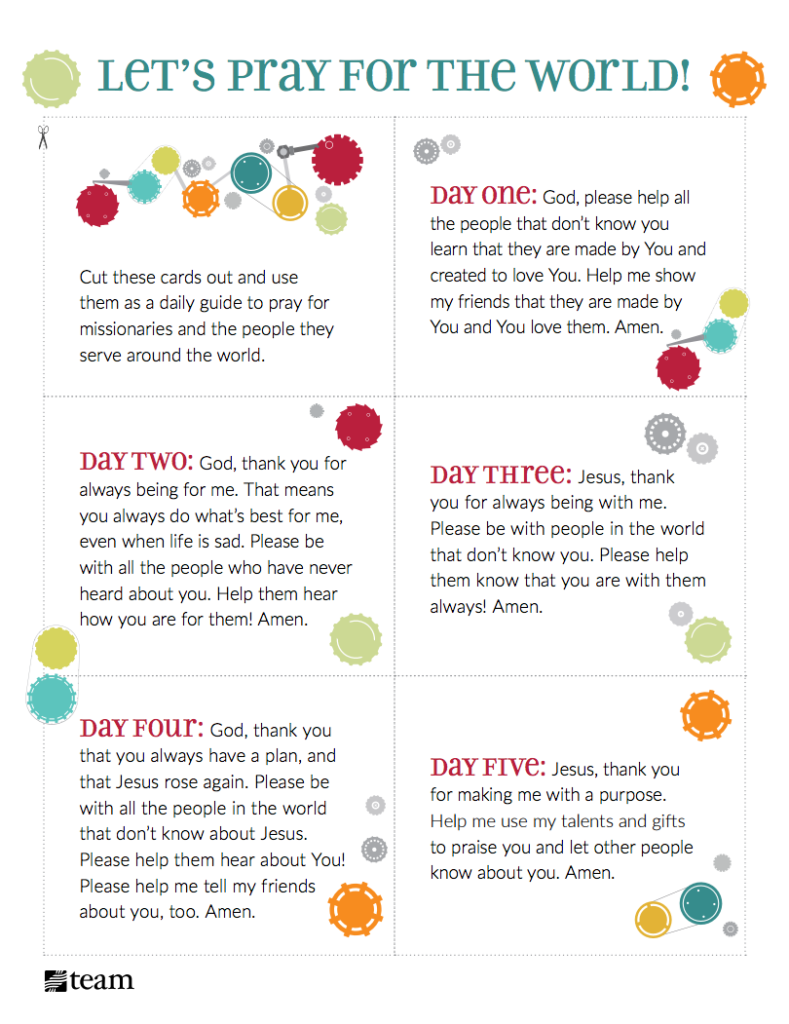
Missionary Life
Actionable Ways to Get Kids Involved in Missions
April 20, 2017
by Anna Price

Jon Acuff writes about a conversation he had with his daughter when she was five. Flipping through a magazine, she saw a picture of a starving child and asked her dad, “That’s pretend, right?”
Acuff writes that what he really felt she was asking was, “You’re not okay with that, are you? Are you doing anything about this, Dad?”
Over the years, adults may become desensitized to the suffering around us, but often children can bring us back to reality: We’re not okay with that, are we? Are we doing something about it?
When it comes to local and global missions, where adults see hurdles, children often see opportunities.
That is why it is so important to connect children with missions from a young age. With even the smallest bit of education and guidance, children can shower Christ’s love on those who need it. Here are four strategies to help you get started.
Encourage Children to Pray for the Lost
When your children say their prayers, encourage them to pray for people who don’t know Jesus. To help them get started, we created “Let’s Pray for the World,” a 5-day prayer activity for you and your child to complete together. Grab your printable copy here.

Regularly Teach Kids About Spiritual and Material Poverty
When telling your kids the story of Jesus, share that there are still people today who haven’t heard the Gospel, and that is why God asks His followers to tell other people about Him.
You can share stories of missionaries in the New Testament, like Philip (Acts 8), Paul (Acts 13), and Aquila and Priscilla (Acts 18).
It can help to make it personal for children by asking questions such as, “What would it be like if you didn’t know Jesus?”
You can also share about how Jesus cared for people in physical need, as well, by healing them, providing food and commanding His followers to take care of the poor. Ask kids, “How can we love the poor like Jesus did?”
For ideas and activities to help you teach these concepts, follow our Missions Resources for Kids board on Pinterest.
When They Have an Idea, Say Yes
When kids have an idea to help missionaries or the people missionaries serve, say yes as much as possible!
“Can I sell lemonade and donate the money for Bibles in Asia?”
“Can I give a toy to my new friend who moved here from another country?”
“Can I write a letter to a missionary kid to let them know I prayed for them?”
Yes, yes, and yes!
You can even prime the pump by asking kids questions like:
- “What’s something you could do to help the kids we saw in that video?”
- “How can you share Jesus with people at your school?
- “Who is someone we can pray will come to know Jesus?”
Make Missions Tangible
When I was a children’s pastor, I showed the kids a picture of Sonia, a girl my family sponsored. We talked about how Sonia’s family sometimes struggled to have enough food for all of the kids, and we learned that Sonia’s country didn’t have many people who knew Jesus.
We began to take turns writing letters to Sonia each week. Without any prompting from me, one fourth-grade student wrote a letter to Sonia outlining the ABC’s of becoming a Christian, something she had learned at Vacation Bible School that year. She ended the letter with, “I believe in Jesus, and he helps me, so I know he can help you, too.”
That fourth grader taught me an important lesson: make it tangible by putting a face to the name, and the kids will take care of the rest.
Free from many of the fears that keep grown adults from sharing our beliefs, my students boldly proclaimed the Gospel when they “met” someone who may not have heard it.
There are many creative ways you can make it tangible for your kids and give them the opportunity to participate in missions. Some examples include:
- Help kids pick a Wish List item and save money toward a donation. Some life changing items are as low as $8!
- Pray with children for missionaries and their families by name.
- Sponsor a child as a family or class.
- Write letters to a missionary family, and talk with kids about why missionaries are needed. Contact a missions agency like TEAM to send the letters to missionaries.
- Volunteer at a local food pantry. Or visit a local nursing home.
- Make a care package for a missionary kid.
When faced with the reality that there are people in need in the world, it is comforting to know there is something we can do about it, no matter our age. Teaching children about the needs of the world, and their ability to help, helps kids grow up with an awareness of God’s command to share the Gospel and serve those in need.
Let us know: how do you or your church involve children in missions?

